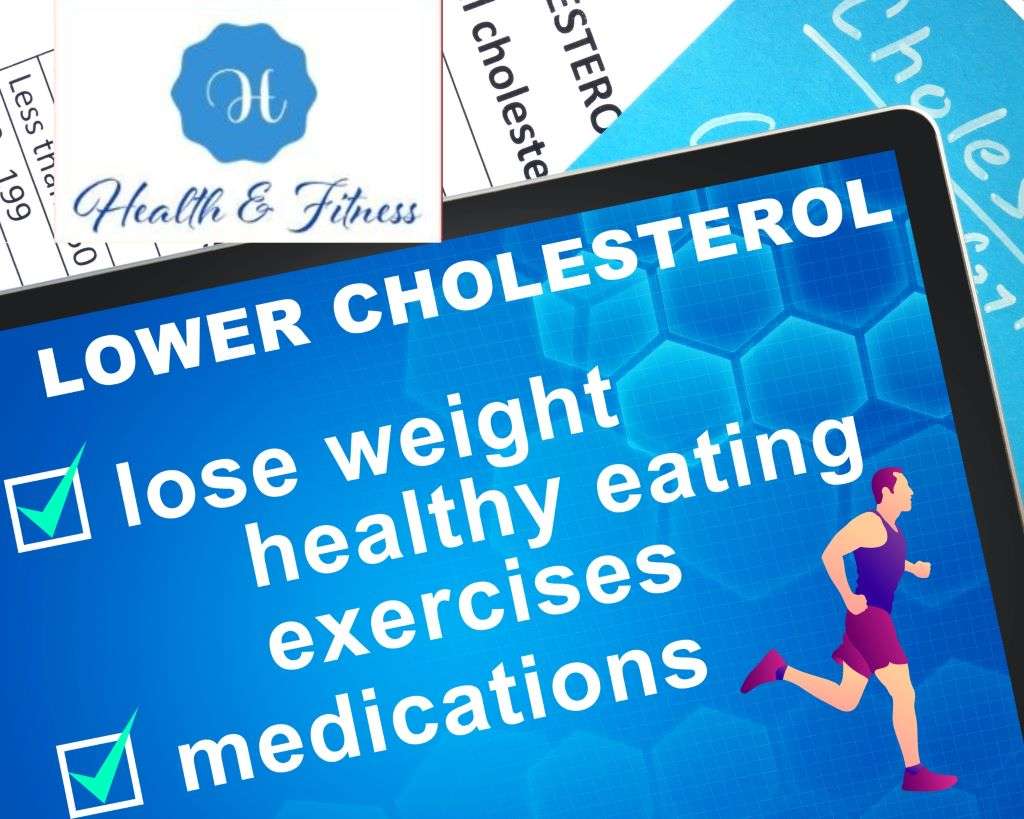Exercises Cholesterol-Lowering and Heart-Health
Explore effective exercises to lower cholesterol and boost heart health. Discover top fitness routines and physical activities to enhance cardiovascular well-being and reduce cholesterol levels. Get started today for a healthier heart.
Introduction
Explore effective exercises to lower cholesterol levels and promote heart health. Discover a range of fitness routines and physical activities tailored to improve cardiovascular health and reduce cholesterol levels. Take charge of your well-being with exercise-based solutions for a healthier heart.
10 Exercises with Cholesterol-Lowering and Heart-Health Benefits Regular exercise has many health benefits and is essential to a healthy lifestyle. One of the significant advantages of exercise is its ability to reduce cholesterol levels, which is crucial for maintaining heart health. This article will explore the link between exercise and cholesterol levels and how daily exercise might improve health. We will also examine the best cholesterol-lowering and heart-healthy exercises. We will also discuss the types of exercises that are most effective in reducing cholesterol levels and improving heart health.
Does exercising lower cholesterol?
Cholesterol levels can be lowered with regular exercise.
Frequent exercise raises “good” HDL cholesterol.
Exercise lowers “bad” LDL cholesterol.
LDL cholesterol-induced arterial wall plaque increases cardiovascular disease risk. Hence, regular exercise reduces cholesterol and heart disease risk.
What is the importance of exercise for heart health?
Regular exercise is essential for maintaining a healthy heart.
Exercise helps to strengthen the heart and cardiovascular system by making the heart muscles work harder and more efficiently.
This improved efficiency increases the heart’s capacity to pump blood, which can reduce the risk of heart disease and other cardiovascular conditions.
In addition, exercise has been found to improve heart health by influencing blood pressure, blood sugar, and weight control.
Therefore, incorporating exercise into your daily routine can help promote heart health and reduce the risk of heart-related health issues.
10 Exercises with Cholesterol-Lowering and Heart-Healthy

Cholesterol levels and heart health can both benefit from consistent physical activity. Here are 10 exercises with cholesterol-lowering and heart-healthy advantages:
1-Walking:
Walking is a low-affected exercise that can help improve cholesterol levels and overall cardiovascular health.
Aim for at least 30 minutes of brisk walking daily to help lower your cholesterol levels.
2- Jogging or Running:
Jogging and running great cardiovascular exercises that can help improve cholesterol levels.
However, these activities can be more intense and should be approached cautiously if you’re not used to high-affected exercises.
3- Cycling:
Like other low-affected exercises, bicycling can help lower cholesterol and boost heart health.
At least 30 minutes of riding every day is recommended, whether on a stationary bike indoors or in the fresh air.
4- Swimming:

Those dealing with joint pain or injuries may find swimming, a low-affected activity is a suitable alternative. Also, it is an efficient method for lowering cholesterol levels and protecting the heart’s health.
5- High-Intensity Interval Training, also known as HIIT.
High-intensity interval training (HIIT) is a workout protocol that alternates between intense bouts of activity and shorter recovery intervals.
Cardiovascular fitness and cholesterol levels are two areas that may benefit from this form of exercise.
6- Weight Training:
Lifting weights or doing resistance exercises can help build muscle, which can improve cholesterol levels and overall heart health.
Strive for two to three sessions of strength training per week, at the very least.
7-Yoga:
Yoga is a low-affected exercise that can reduce stress, increase flexibility, and promote heart health. Some types of yoga, such as power yoga, can also be a successful cardiovascular workout.
8-Pilates:
Building core strength and improving posture are the primary aims of Pilates, a low-affected exercise that focuses on these areas.
This can help lower one’s risk of developing heart disease and improve one’s cholesterol levels.
9- Rowing:
As a full-body exercise, rowing has been shown to benefit heart health and cholesterol levels. Rowing at a moderate intensity for at least half an hour multiple times a week is a worthy goal, whether on a rowing machine or in the open air.
10- Dancing:
Cardiovascular health can be improved and enjoyed concurrently through dancing.
It would be best if you made it a goal to engage in at least thirty minutes’ worth of dancing of a moderate intensity every few days, regardless of whether you do it at a dance class or simply by moving to some music in your living room.
Remember, any exercise can benefit heart health and cholesterol levels.
The key is finding activities you enjoy and can consistently stick to.
To benefit from exercise’s cholesterol-lowering and heart-healthy effects, if you want to stay healthy, you need to get at least 150 minutes of moderate activity every week.
Additional Lifestyle Modifications for Cholesterol and Heart Health
While exercise is crucial in managing cholesterol levels and improving heart health, it’s important to note that it’s not the only factor contributing to overall well-being.
Here are some additional lifestyle changes that can help complement exercise and maximize cholesterol-lowering and heart-healthy benefits:
1- Healthy Eating:

Eating a balanced and heart-healthy diet can significantly affect cholesterol levels and heart health.
Adding foods high in fiber, omega-3 fatty acids, monounsaturated fats, and polyunsaturated fats into one’s diet will help reduce LDL cholesterol levels and the risk of developing heart disease. Also, to improve your overall health, you should avoid meals heavy in cholesterol, saturated and trans fats and sodium.
2- Quit Smoking:
Smoking has been shown to affect heart health negatively, raising LDL cholesterol levels and increasing the risk of heart disease.
Quitting Smoking can lead to a reduction in LDL cholesterol levels and a significant improvement in overall heart health without negatively affecting it.
3- Stress Management:
Chronic stress has been linked to many adverse health outcomes, including increased cholesterol levels and a higher risk of heart disease.
Stress-reducing activities such as yoga, meditation, or deep breathing exercises can help lower stress levels and improve overall health.
4- Keep Your Weight at a Healthy Level
Some evidence links high cholesterol levels and heart disease risk to being overweight.
Regular exercise and a healthy diet can help manage weight and improve cholesterol levels.
5- Limit Alcohol Consumption:
Consuming excessive amounts of alcohol has been linked to high cholesterol levels and increased risk of heart disease.
Limiting alcohol intake can help improve cholesterol levels and overall heart health.
6- Get enough sleep:
Lack of sleep can raise cholesterol levels and increase your risk of heart disease.
Getting enough sleep, typically 7-8 hours per night, can help lower cholesterol levels and improve heart health.
7- Manage underlying health conditions:
If you also suffer from hypertension, diabetes, or excessive body fat, managing these conditions can help improve your cholesterol levels and reduce your risk of heart disease.
8- Take medications as prescribed:
If your cholesterol levels remain high despite lifestyle changes, your healthcare provider may prescribe medications to help lower your cholesterol levels.
Taking these medications as prescribed is essential to help improve your cholesterol levels and reduce your risk of heart disease.
Incorporating these lifestyle changes and regular exercise can help maximize cholesterol-lowering and heart-healthy benefits.
It’s important to note that these changes may not produce immediate results, and it may take some time to see noticeable improvements.
However, consistency and dedication to a healthy lifestyle can lead to long-term cholesterol and heart health benefits.
Conclusion
Regular exercise helps manage cholesterol and heart health.
Exercise lowers LDL cholesterol, raises HDL cholesterol, and lowers heart disease risk.
It can also help circulation, weight loss, and mental health.
Exercise alone cannot manage cholesterol or heart health.
Smoking, alcohol, food, stress, and sleep are also essential.
Recommendation
You may lower your cholesterol and heart health by exercising regularly and adopting a healthy lifestyle. Before starting a new workout regimen, see your doctor and choose activities you’ll enjoy and stick with.
References
- American Heart Association: https://www.heart.org/en/healthy-living/fitness
- Centers for Disease Control and Prevention: https://www.cdc.gov/physicalactivity/basics/index.htm
- Mayo Clinic: https://www.mayoclinic.org/healthy-lifestyle/fitness/in-depth/exercise-and-cholesterol/art-20045964
- National Heart, Lung, and Blood Institute: https://www.nhlbi.nih.gov/health-topics/physical-activity-and-your-heart
- American Council on Exercise: https://www.acefitness.org/education-and-resources/lifestyle/blog/6782/the-benefits-of-exercise-for-heart-health



